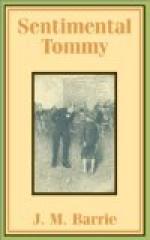“So be it. The prideful onion is his who wins her.”
“Have at thee, caitiff!”
A terrible conflict ensues. Cathro draws first blood. ’Tis but a scratch. Ha! well thrust, Stroke. In vain Cathro girns his teeth. Inch by inch he is driven back, he slips, he recovers, he pants, he is apparently about to fling himself down the steep bank and so find safety in flight, but he comes on again.
("What are you doing? You run now.”)
("I ken, but I’m sweer!”)
("Off you go.”)
Even as Stroke is about to press home, the cowardly foe flings himself down the steep bank and rolls out of sight. He will give no more trouble to-night; and the victor turns to the Lady Grizel, who had been repinning the silk scarf across her breast, while the issue of the combat was still in doubt.
("Now, then, Grizel, you kiss my hand.”)
("I tell you I won’t.”)
("Well, then, go on your knees to me.”)
("You needn’t think it.”)
("Dagon you! Then ca’ awa’ standing.”)
“My liege, thou hast saved me from the wretch Cathro.”
“May I always be near to defend thee in time of danger, my pretty chick.”
("Tommy, you promised not to call me by those silly names.”)
("They slip out, I tell you. That was aye the way wi’ the Stuarts.”)
("Well, you must say ‘Lady Grizel.’) Good, my prince, how can I thank thee?”
“By being my wife. (Not a word of this to Elspeth.)”
“Nay, I summoned thee here to tell thee that can never be. The Grizels of Grizel are of ancient lineage, but they mate not with monarchs. My sire, the nunnery gates will soon close on me forever.”
“Then at least say thou lovest me.”
“Alas, I love thee not.”
("What haver is this? I telled you to say ’Charles, would that I loved thee less.’”)
("And I told you I would not.”)
("Well, then, where are we now?”)
("We miss out all that about my wearing your portrait next my heart, and put in the rich apparel bit, the same as last week.”)
("Oh! Then I go on?) Bethink thee, fair jade—”
("Lady.”)
“Bethink thee, fair lady, Stuart is not so poor but that, if thou come with him to his lowly lair, he can deck thee with rich apparel and ribbons rare.”
“I spurn thy gifts, unhappy man, but if there are holes in—”
("Miss that common bit out. I canna thole it.”)
("I like it.) If there are holes in the garments of thy loyal followers, I will come and mend them, and have a needle and thread in my pocket. (Tommy, there is another button off your shirt! Have you got the button?”)
“(It’s down my breeks.) So be it, proud girl, come!”




